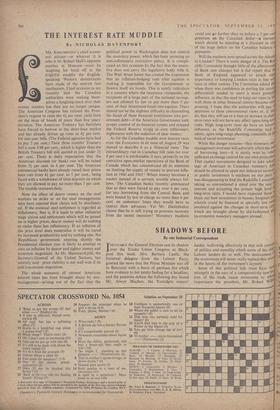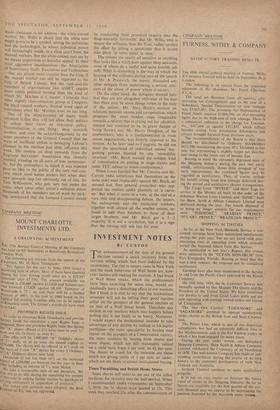SHADOWS BEFORE
By our Industrial Correspondent
INEVITABLY the General Election cast its shadow over the Trades Union Congress at Black- pool this week. Mrs. Barbara Castle, the fraternal delegate from the Labour Party, greeted the news that the Prime Minister was off to Balmoral with a burst of partisan fire which bore evidence to her pretty feeling for a headline; and the pensions debate the following day found Mr. Alwyn Machen, the Yorkshire miners' leader, wallowing effectively in that rich mix of politics and morality which some of the 0 Labour leaders do so well. The desiccation° the economists will never really replace this ni in the hearts of the movement's laymen.
Some of this political talk must have I' strangely in the ears of a comparatively new' tion of the trade union movement to Nyl' importance the president, Mr. Robert WI On-
sec os`
1115
tl
made obeisance in his address—the white-coated worker. Mr. Willis is afraid that the white coat might proVe to be a symbol, setting the technician and the technologist, in whom industrial power will increasingly reside, in a class apart from the manual workers. But the white-coated men are by no means impervious to-Socialist appeal. In their most aggressive manifestation—the Association of Supervisory Staffs. Executives and Technicians --they are almost more royalist than the king, if the manual worker can still be regarded as the king of British Labour. But the rank-and-file members of organisations like ASSET require more subtle political wooing than the kind of Which Mr. Machen is a master. Certainly that other slightly class-conscious group in Congress, the black-coated workers, showed some signs of restiveness when Mr. Machen went on too long.
One of the idiosyncrasies of many trade unionists is that they will not allow their politics lo colour their views on industrial policy. Nationalisation• is one thing: shop stewards another, and even the acknowledgement by the saner members of the General Council that the wave of unofficial strikes is damaging Labour's chances in the election had little influence this week. The motion on shop stewards from the Engineer Surveyors' Association was clumsily worded, treading on all sorts of toes unnecessar- ily• but the atmosphere in which it was rejected gave no idea to the public of the very real con- cern which most union leaders feel when their own stewards step too obviously out of line. Sir tom Williamson, who gets very hot under the collar when some other union's militants throw thousands of his members out of work by strik- ing, announced that the General Council would
be conducting their promised inquiry into the shop stewards 'forthwith.' But Mr. Willis, who is nearer the militants than Sir Toni, rather spoiled the effect by telling a questioner that it would take place 'at some point in time.'
The unions are nearly all sensitive to anything that looks like a witch hunt against shop stewards, most of whom do a useful and quite humble job well. What is disturbing is the way in which the braying of the militants during part of the speech of Mr. A. Prestwich, the mover, dissuaded any other delegate from undertaking a serious criti- cism of the abuse of power where it occurs.
On the other hand, the delegates showed later that they are not altogether oblivious of the fact that there may be some things rotten in the state of the unions. Mr. Alan Birch's motion on relations between unions and co-operation, which proposes the most modest steps imaginable towards a reform that is crying out for attention, seemed last weekend to be in grave danger of being thrown out. Mr. Harry Douglass, of the steelworkers, who is a fundamentalist in trade union negotiations, was bitterly opposed to the motion. As he later said to Congress, he did not want the spearhead of individual unions' bar- gaining powers blunted by any 'monolithic structure.' (Mr. Birch wanted the mildest kind of consultation on putting in wage claims and some TUC advice to union conferences.)
When it was learned that Mr. Cousins and Mr. Carron (who sometimes find themselves on the same side) were implacably against Mr. Birch, all seemed lost. One general councillor who sup- ported the motion spoke gloomily of 'a carve- up.' But when it came to a vote, at the end of a very thin and disappointing debate, the miners, the railwaymen and the municipal workers, together with almost all the smaller unions, re- fused to add their hatchets to those of their larger brothers, and Mr. Birch got a 5-2 majority. It is not a revolution, but it is a sign that the ice-cap will not last for ever.



































 Previous page
Previous page